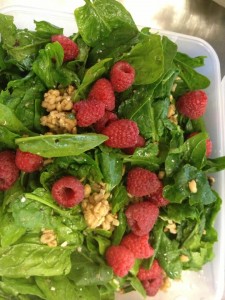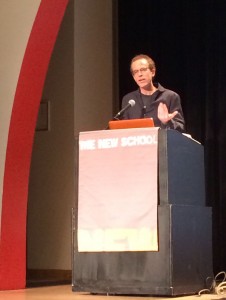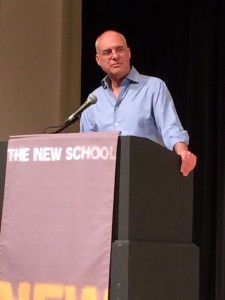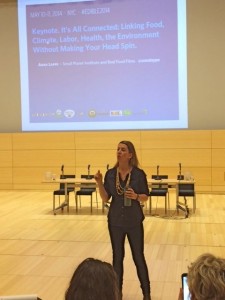 May 13, 2014 – A feast of ideas on how to grow the good food movement and why it’s so essential for the future of our planet was served up at the annual Edible Institute last weekend.
May 13, 2014 – A feast of ideas on how to grow the good food movement and why it’s so essential for the future of our planet was served up at the annual Edible Institute last weekend.
Deep-thinking chef Dan Barber—founder of Blue Hill restaurant and author of a new book called The Third Plate—opened the conference by challenging our way of thinking about farm fresh food.
“Farm to table may be the most exciting movement taking place right now, but it doesn’t work, because it has not shifted food policy,” Barber told the annual gathering of Edible magazine publishers and editors, which took place ahead of the public Edible Institute at The New School in New York City May 8–11.
“Farm to table doesn’t work unless it’s tethered to a cuisine or a pattern of eating that doesn’t allow me to cherry pick what I want,” he said, citing peasant French, peasant Italian and American Southern cuisine as examples. Barber advocates a year round “whole farm” approach to cooking that includes buying and eating cover crops like mustard and pea tendrils—much as “whole animal” cooking calls for making use of all parts of cow, pig or lamb. His idea is to help provide additional financial incentives for organic farmers who take care of their soil by planting nitrogen-fixing crops and other soil-building plants.

In his New York restaurants, Barber prepares a dish called Rotation Risotto which contains all the crops grown in rotation to build up the soil by farmer Klaas Martens on his Finger Lakes area wheat farm. Barber swears the emmer wheat Martens grows is the best he’s ever tasted, but with this dish acknowledges the years of soil building with crops like spelt, brassicas, rye, mustard and beans that precede an exceptional tasting wheat harvest.
Barber also took on the conventional wheat industry, explaining: “On 60 million acres of wheat in the Midwest, a blast of nitrogen fertilizer goes into the fields a few weeks before harvest to boost the protein content of the wheat to 16% or even 17%.” The bread industry likes high-protein flour because it makes the dough easier to handle and better rising, but Barber pointed out that much of the fertilizer runs off into the Mississippi River basin and the bread is harder to digest.
“France has a law against wheat produced with more than 12% protein and I don’t hear anyone complaining about their bread,” he said. “There’s nothing bigger than tackling the bread industry!”

New York Times food writer, recipe creator and author Mark Bittman was the keynote speaker at the public portion of the institute—which attracted good food advocates from around the country.
“People are always telling me there’s nothing left we can eat. But everyone knows what to do—eat less, eat real foods, whole plants—the problem is that we live in a food carnival, a place where we’re constantly being assaulted by ‘eat me’ signals,” Bittman said.
He used the opportunity to talk about a provocative article he wrote last week arguing that GMOs and organics may not be the most important issues for the food movement to focus on.
“GMO food is dangerous to us mostly because it’s crap,” he said. “Getting rid of GMOs would be nice, but it’s not as important as banning the prophylactic use of antibiotics in animals, banning advertising of junk food to kids and banning the sale of sugary beverages to under 18s.”
“People have died because of diabetes and superbugs, but no one has died because of GMOs,” he reasoned.
Tackling organics, he admitted they are better for the environment and for farm workers. “But what’s better for you? An organic cheeseburger or a conventionally grown apple?” he asked.
“The most radical thing you can do to improve your diet is cooking at home,” said the author of How to Cook Everything. “By letting others cook for us we relinquish control to companies that don’t care about us and that’s nothing short of reckless. Cooking puts us back in the driver’s seat.”
Edible Institute included a dozen thought provoking sessions on important food issues like sustainable fisheries, food justice, pollinators, fermented foods, craft beer and craft distilling, as well as technology and fracking. You can watch videos from Day 1 here and videos from Day 2 here.
“In Pennsylvania, fracking has caused a 30% loss in production at dairy farms,” said speaker Wenonah Hauter, the director of Food and Water Watch. “What we are learning from Pennsylvania is that fracking is a disaster for farming.”
“Food is a gateway issue to connect people to environmental issues,” said Brian Halweil, publisher of four Edible magazines in the New York City area and one of the institute organizers.

co-founder of the Small Planet Institute
The final day kicked off with a passionate presentation by sustainable food advocate Anna Lappé, co-founder of the Small Planet Institute with her mother Frances Moore Lappé. Her job was to fire up the crowd with ideas on how to push the food movement forward.
It starts, she said, by “breaking the spiral of silence” on opinions that are not considered mainstream. By speaking up with ideas that may be different, others are emboldened to speak out as well.
“I’m convinced people can handle the bad news,” she said. “It’s not challenge that does in the human spirit, it’s feeling powerless and alone.”
Countering those who try to marginalize the food movement, she said: “We can make it clear who the real food elitists are. The real food elitists are those who do nothing while vast tons of junk food and sugary drinks are flooding the neighborhoods of the most underserved communities in this country; the real food elitists are those who remain silent while an epidemic of diet related diseases are sweeping our country; the real food elitists are those people who are propping up a broken food system that shuts out 47.6 million Americans who have to rely on nutrition assistance.”
In a tearful response to Mark Bittman’s earlier presentation, Lappé countered that she buys organic food for her precious daughters not because she’s elitist, but so that another mother—a farmworker—doesn’t have to work around pesticides. “I want to know that no other mother had to worry about whether chemicals used to grow that food had made her children sick or had stunted their intelligence or planted the seed of cancer in their body,” she said.
It will take some time to digest all the inspiration and ideas we gleaned from the Edible Institute, but you can expect to see many of them expressed in the upcoming year on the pages of Edible Monterey Bay magazine.
About the author
Deborah Luhrman is publisher and editor of Edible Monterey Bay. A lifelong journalist, she has reported from around the globe, but now prefers covering our flourishing local food scene and growing her own vegetables in the Santa Cruz Mountains.
- Deborah Luhrmanhttps://www.ediblemontereybay.com/author/dluhrman/
- Deborah Luhrmanhttps://www.ediblemontereybay.com/author/dluhrman/
- Deborah Luhrmanhttps://www.ediblemontereybay.com/author/dluhrman/
- Deborah Luhrmanhttps://www.ediblemontereybay.com/author/dluhrman/


